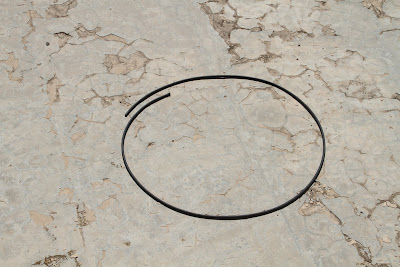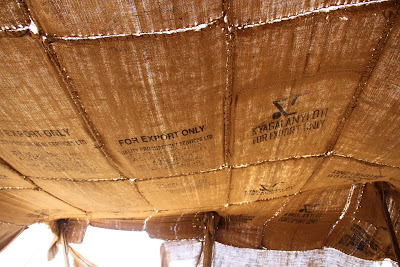
P A R L I A M E N T







In the Parliament building it is possible to reach one's hands up and caress the swathes of listening tubes, which divide and pipe in the sounds of the split city in an attempt to create a total library.
All of the sounds that are collected are processed and rolled into small brown balls that are shat serenely onto the floor. They form small mountains that mirror the serrated topography of the rocky outcrops, and steep olive groves swathed in the pale fur of heat-bleached grass.
S E P T E M B E R
The air is stifling, sexless, and reeks of the memories of split things. The most insulting are bones.
As the mechanism of the sun moves round to cast hot slivers between the railings on the balcony, it is possible to shed the clasping rasping skin and catch it by lying spreadeagled, Etant Donne, under the eyebeams.
As the mechanism of the sun moves round to cast hot slivers between the railings on the balcony, it is possible to shed the clasping rasping skin and catch it by lying spreadeagled, Etant Donne, under the eyebeams.
A U G U S T
You could imagine that the surface of the earth beyond the collision of the fraying borders has been crumpled by the pressure exerted from the smoothing of the flatlands. There are doughy peaks that rise like desert bread from steep troughs, the surface etched thinly by circuitous routes.
Stone is thrown up from amongst the milled powder of quarries, and adheres to the surface of buildings that mark space, and reproduce radially like barnacles clinging to the hulls of distant ships.
Fine particles of dust lash through the open windows of vehicles that crunch over the pin-striped roughened road surfaces, to slow descent.
The air has cooled off here from the swelter, and there is a strong wind that gusts through open doors, knocking untethered things over onto the grey grime that gathers on the floor, and carbon copies our footprints.
Stone is thrown up from amongst the milled powder of quarries, and adheres to the surface of buildings that mark space, and reproduce radially like barnacles clinging to the hulls of distant ships.
Fine particles of dust lash through the open windows of vehicles that crunch over the pin-striped roughened road surfaces, to slow descent.
The air has cooled off here from the swelter, and there is a strong wind that gusts through open doors, knocking untethered things over onto the grey grime that gathers on the floor, and carbon copies our footprints.
B E I T . S A H O U R
There is a call to prayer at 04.11. At 04.12 another joins it, closer, filling in all the spaces. By 04.16 they have been replaced by the call and response volleys of packs of wild dogs. As the longest memories are governed by instincts, they embrace their inner wolf.
At 04.59 a church bell rings a few times at the pace it takes to tilt on its axis and let the stamen hit the rim. Then the dogs return, briefly.
At 04.59 a church bell rings a few times at the pace it takes to tilt on its axis and let the stamen hit the rim. Then the dogs return, briefly.
I S R A E L . P A L E S T I N E
In Israel there were the angled Anopheles, black darts picked out on white ceilings. They cause hot red swellings that shift the shape of limbs.
In Palestine the small stone-coloured Culex are impossible to see in tungsten light, and only betray their presence with the taut whine of their wings. Pin-pricked constellations are traced nightly as if arms and ankles have been run through with a sewing machine to stitch them back beneath the sweaty sheets.
In Palestine the small stone-coloured Culex are impossible to see in tungsten light, and only betray their presence with the taut whine of their wings. Pin-pricked constellations are traced nightly as if arms and ankles have been run through with a sewing machine to stitch them back beneath the sweaty sheets.
B O M B S
The word BLAST judders out, leaping frantically or gliding smoothly between carriers more rapidly than a manifesto.
A R A B I A N . S E A





A new pair of knuckles knocked a loose percussion on window glass each time the traffic stopped, asking for Rupees, and pairs of boys wound round us on motorcycles as we clunked into potholes on the way to the clean beach. The waves were high and warm and clutched the sand roughly backwards into the swell of each crest. A Balochi fisherman handed us strings of shells for our necks, and dressed camels ambled by offering rides, while carloads of young people opened up trunks filled with speakers, and got drunk and stoned into nightfall.
K A R A C H I

I have been accused of crossing borders too easily. I inhabit the voices of my forefathers in the temporal measures of pipette drops from dripping taps in locked rooms. I am Marco Polo speaking the same city to fractal infinitude for the ears of Kubla Khan, I am an Andalusian Dog, I am an Orpheus placed like a chess piece, wide-eyed from international flights, and cowering from Medusa stares.
I prefer the white noise of a fan rippling bedsheets and peeling up the corners of loose sheets of paper, the popping buffets of a rolled down window, to the too cool touch of air conditioning. The point is not to deny the city, but to let it simmer against a man-made breeze.
There are thousands of Karachis that coexist, knotted together and held tightly against the surface of sun-blasted concrete. I observe from a single jealous viewpoint.
In one the water is laced with pathogens, fine for hands but not unprimed lips, and the air carries biting insects laced with tropical fever - I drink from bottles and sleep nighty, bridally, in an unhung mosquito net, smothered in DEET to ward off the needle jabs of mouth parts. There are bomb blasts and maimings fraying small holes in the fabric, secreted unseen in newsprint and reportage.
In another there are boys carrying jasmine bracelets to the windows of cars, against the stream of riotous peacock metal of the Patan buses, which line the back streets at night containing softly sleeping men. Sand-coloured dogs with black muzzles trot through foothills of discarded packaging, snuffling for food.
Last night we hired a sailing boat and crew, and trod through a concrete pagoda in the port, past the sacrificial stains of spit paan. After a moment of negotiation, because foreigners are not allowed to enter the port for reasons of security, we were tugged out to a stretch of water in the harbour, past the point where the tang of sewage entering the sea was diluted enough to disappear, and dropped anchor in the moonlight. We were surrounded in the distance by the black shapes of empty boats, with the occasional blinking light, that form a loosely wound floating land mass on the water, mediating between the edges of the city and the Arabian Sea. The crew cooked freshly caught crab in Masala spices by lamplight, and we pulled the sweet white flesh from the claws with our teeth, and ate it with curried potato and fried naan.
On the way back some firing had broken out on a bridge, so we formed a hushed convoy, apart from logistical phone calls, and traced an alternative route into the city via the tire-furrowed lines of a military route.
Y A N G C H E N G . L A K E



Yangcheng Lake radiates towards horizonlessness, with slim shispers of low slung buildings faintly delineating the distant rim. The upper edges of the black cages of fish farms offer the only distinct lines protruding from the stilled surface. Perhaps they contain the hairy crabs, famous for being a regional delicacy. Although we had missed crab season, we were treated to a late lunch of lake fish, tiny shrimps, and crinkled back fungus, wet as sea weed.
Outside a shallow dark wooden boat containing two stooped textile-fattened figures drifted slowly alongside the cages. On the land the figures multiplied as a multitude of small elderly workers, orbiting each other calmly, tracing the measured lines of an orrery around the task in hand. They tended small fields and planted young trees, each wrapped to their knees with coils of rope, and supported by four metal poles that buttress them against ice and seasonal winds.
Even in April sunshine the women's heads are wrapped like Matryoshkas to the brink of faces leathered as bogwood, their clothing fiercely polychrome. They ride identical black bicycles, which creak along highways burdened with crags built of bundles and frayed cardboard.
On the lakeshore a five star hotel complex has appeared, engulfing them into a pastoral scene flanked by the manicured tendrils of lawns and crisp cut pathways. It frames sunsets through large windows, while in the lobby a fountain bubbles from venetian glass lilies resting on black marble.
The hotel offers impossible luxury, and produces these people, suddenly, as a museum of rare specimens, bright as beetles. They carry the lengths of cut bamboo that forms the exoskeleton of encroaching construction, as if they are the long pins that will fix them in time, as memories.
S H A N G H A I


In the Temple of the City God the air is swirled with the piquant musk of incense sticks, finger thick, purchased from a small stand in the corner. They are lit over flames in oil drums, and held smoking into a revolution of compass points, before being consigned to the fire in a covered trough, carved with script.
An old woman begs, with teeth splayed as wide as fingers. She has lived through the twentieth century to end up here, back with the old gold gods, ousted by the rigid red gods of ideology, and the flickering gods of world markets.
F L I G H T

The dim-lit roaring cabin is tunnelling its way in a smooth arc through the airspace of northern Russia, between Moscow and Archangel. Through the narrow window in the auricular moulding in the rear door, marked with the standard drilled perforations that allow pressures to equalise, the land mass beneath is Prussian ink, drifting serenely. Every so often the dark mass is interrupted by fractured mandalas of distant sodium lights, locked in suspension like bioluminescent creatures tracing their own peripheries.
This mechanism is all eyes and ears, the same species as text.
I am anticipating the timesickness that rolls out with every meridian line. This time it will be eight, clicking into seven.
Subscribe to:
Posts (Atom)



















